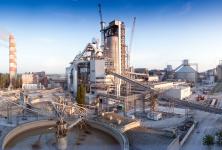Eco-Friendly Innovation: ECA's EUROGRIND Cement Additives and its Environmental Benefits

Eco-Friendly Innovation: ECA's EUROGRIND Cement Additives and its Environmental Benefits
Introduction
In an era where sustainability is paramount, industries are seeking innovative solutions to minimize their environmental footprint. ECA's EUROGRIND, a groundbreaking 3rd generation cement additive designed as a grinding aid and performance enhancer, is not only transforming the efficiency of cement factories but is also making significant strides in reducing the environmental impact of cement production. Let's explore the remarkable environmental benefits EUROGRIND brings to the table.
1. Reduced Energy Consumption
EUROGRIND optimizes the grinding efficiency of cement production, leading to a substantial reduction in energy consumption during the grinding process. This directly translates into lower greenhouse gas emissions, contributing to a more sustainable and eco-friendly manufacturing process.
2. Lower Carbon Emissions
By enhancing the efficiency of cement grinding, EUROGRIND aids in lowering the carbon emissions associated with the production of cement. The reduced energy requirements mean fewer fossil fuels are burned, aligning with global efforts to combat climate change.
3. Sustainable Raw Material Use
EUROGRIND's role in improving grinding efficiency contributes to a reduction in the clinker factor, which is a key component in cement production. This sustainable approach helps conserve raw materials, lessening the environmental impact of extracting and processing these resources.
4. Minimized Environmental Impact of Clinker Production
Clinker production is a resource-intensive and emission-heavy stage in cement manufacturing. EUROGRIND's ability to reduce the clinker factor directly translates to a minimized environmental impact during this critical stage of production.
5. Contribution to Circular Economy
By optimizing grinding efficiency and promoting the use of alternative cementitious materials, EUROGRIND supports the principles of a circular economy. The additive encourages the reuse of waste materials, reducing the demand for virgin resources and promoting a more sustainable production cycle.
6. Lower Environmental Footprint Across the Supply Chain
EUROGRIND's environmental benefits extend beyond the factory gates. By reducing energy consumption and improving the overall efficiency of cement production, the additive positively impacts the entire supply chain, from raw material extraction to transportation.
7. Compliance with Environmental Regulations
Cement factories using EUROGRIND demonstrate a commitment to environmental responsibility, aligning with stringent environmental regulations. The additive aids in achieving compliance with emissions standards and sustainability benchmarks.
8. Promotion of Sustainable Practices
EUROGRIND sets a precedent for the industry by showcasing how innovation can drive sustainability. Cement factories adopting this additive signal their dedication to sustainable practices, influencing others in the industry to follow suit.
Conclusion
ECA's EUROGRIND is not just a technological breakthrough in cement production; it is a catalyst for positive environmental change. By significantly reducing energy consumption, carbon emissions, and the environmental impact of clinker production, EUROGRIND is leading the way toward a more sustainable and eco-friendly future for the cement industry. As industries around the world strive for greener practices, EUROGRIND stands as a testament to the power of innovation in fostering environmental stewardship.

